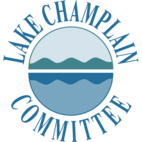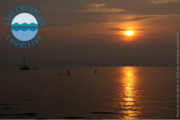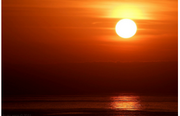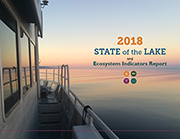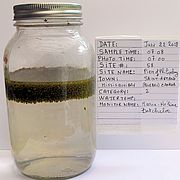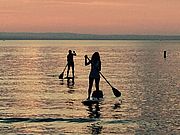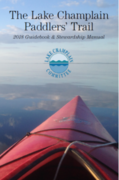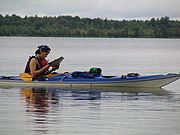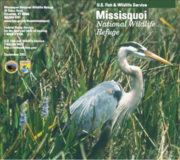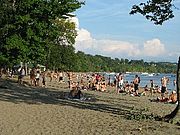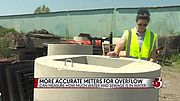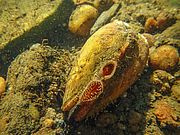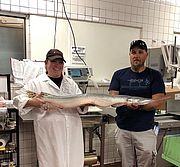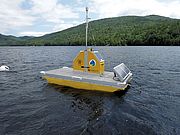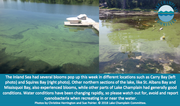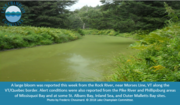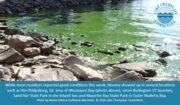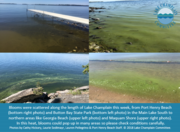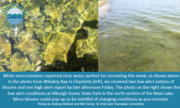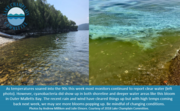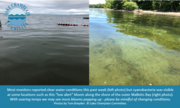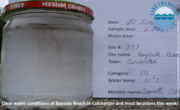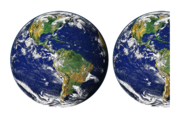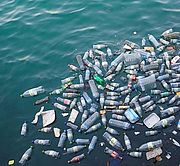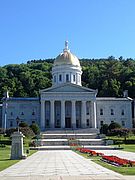Read about recent water news in the Champlain Basin and find out about upcoming events in the Summer's Wane E-news!
News from Selected Category
It’s been another busy week of monitoring with 121 reports filed for Lake Champlain and inland lake locations. While good conditions persisted at most locations, blooms did show up on some inland lakes and on all sections of Lake Champlain except for the South Lake. Please be mindful that conditions can change rapidly.
From July 18 to August 16, a stretch of 29 days, the daily high temperature in Burlington, Vermont never fell below 80 degrees F. The streak eclipsed the previous record for consecutive days over 80 by four days. Keep in mind, the streak of hot days began AFTER temperatures climbed into the 90s for six straight days earlier in July. During that heat streak the region set another record, the highest ever daily low temperature of 80 degrees.
“This report helps the public to interpret information about the Lake using the best scientific data available. Lake managers use this information to develop and assess strategies for improving water quality in Lake Champlain,” said Dr. Eric Howe, LCBP Director. “In the 2018 report, we provide updated information on the many issues facing Lake Champlain.”
Hats off to the great group of dedicated cyanobacteria monitoring volunteers who are reporting on water quality from over 100 Lake Champlain shoreline locations and inland lakes. LCC has trained nearly 300 individuals this season to identify cyanobacteria, including state and municipal recreational staff and water treatment system operators.
Stay up to date on water conditions on Lake Champlain and inland lakes with LCC’s weekly cyanobacteria reports. The report compiles and summarizes data collected from over 100 LCC monitoring sites in New York, Vermont and Quebec. It also includes helpful information on how to recognize and report cyanobacteria and actions to take to reduce bloom frequency.
A 2013 report identified stand-up paddling as the outdoor sport with the most first-time participants in the United States that year. Though variations of stand-up paddling have been around for centuries, the current craze began in the early 2000’s. At that time, Hawaiian surfers brought the sport to California. Stand-up paddling proved to be an easier entry point for novices to the surfing world and rapidly grew in popularity, spreading throughout the country and to inland waters like Lake Champlain.
Late summer and early fall can be wonderful times on the water. Make the most out of them with the 2018 edition of the Lake Champlain Paddlers' Trail guidebook. It’s jam-packed with helpful information for great lake adventures, including site descriptions and chartlets for more than 40 Trail locations (with access to over 600 campsites), launch site listings, natural history articles, safety and stewardship tips, equipment check lists, and more!
Boating on the lake can be a wonderful experience if you are well prepared and use common sense. Changing weather, variable water conditions, and other activity on the lake can affect your safety and enjoyment. Please follow these guidelines while traveling on the Trail.
Situated on Lake Champlain, the Missisquoi National Wildlife Refuge is nationally recognized for its biological diversity and high quality wetlands. Established in 1943 to provide habitat for migratory birds, it consists of nearly 7,000 acres of refuge for avian creatures and other wildlife.
Sand and waves, suntan lotion, bathing suits, a child’s plastic pail and shovel for building castles. Spending a day at the beach is a long standing summer tradition, but did you ever wonder why there aren’t more beaches? Why do beaches form along some coves on Lake Champlain but not others?
Adirondack Explorer - Located less than 2 miles upstream of Ausable Forks, the Jay Town Board voted in March of 2017 to remove the dam after an engineering study found that it posed a threat to residents downstream because of its potential to fail.
WCAX TV - The city recently installed new meters in the combined-sewage overflow pipes. The meters will show not only how much water overflows but what percentage is sewage versus stormwater.
VPR - Here in Vermont there are eighteen separate species of freshwater mussels and of those, ten are listed as threatened or endangered while several others are considered rare.
NBC - On the waters of Lake Champlain, researchers are searching for clues. The goal is to better understand a rapid increase of the Lake Trout population after it inexplicably vanished in the early 1900's.
The Buffalo News - Another fish record has been broken. This time it’s an impressive longnose gar that weighed in at 14.85 pounds by Mike Gatus of Hoosick Falls.
Seven Days - Founded in 2013, the Jefferson Project is turning Lake George into what it calls "the world's smartest lake," with the goal of better understanding, protecting and sustaining this crown jewel of the Adirondack region. The multimillion-dollar collaboration was named for Thomas Jefferson, who visited Lake George in 1791 and described it in a letter to his daughter as "without question, the most beautiful water I ever saw."
Clear water was generally reported this week from most sections of Lake Champlain, with the exception of several alert level conditions observed by monitors in northern sections of the lake like the Inland Sea, St. Albans Bay and Missisquoi Bay. Conditions have been changing daily at some locations, so please keep a watchful eye and use the links and resources in this email to learn <link lcc-at-work algae-in-lake>ways to recognize and <link get-involved volunteers cyanobacteriamonitors cyanobacteria-monitor-reporting-form>report on cyanobacteria. Read...
While good conditions were primarily reported this week, blooms popped up in many sections of the lake and at some inland lakes. As of late afternoon Friday (8/17/18) we received 120 reports from Lake Champlain and inland lake sites. Scroll down to see pictures of the filamentous green algae scums that were showing up in some areas of the lake. People often confuse decaying green algae with cyanobacteria. Read...
Yet another busy week of monitoring as alert level conditions were reported from several Lake Champlain locations and inland lakes. A large bloom was observed at the Rock River near Morses Line, Vermont on the VT/Quebec border and also in the Saxtons River Recreation Area in Rockingham, VT. There’s stagnant warm water in rivers across the region due to the lack of rain. Please spread the word that blooms aren’t restricted to lakes and ponds, they can be found in rivers as well.Read...
July was a hot, steamy month with blooms popping up in various places around the lake. (July was officially the hottest for Burlington VT since the National Weather Service began keeping records in 1892.) The high heat and sultry weather has continued into August, a time of year when cyanobacteria blooms are more common. Please enjoy the water but keep a careful watch for cyanobacteria. Read...
Another busy week that brought much needed rain. While most Lake Champlain Committee (LCC) monitors reported good conditions throughout the week, some blooms did show up on Lake Champlain but not at any of the inland lakes that reported this week.Additionally, on Friday morning (7/27) two Burlington, VT beaches (Blanchard at Oakledge Park and Leddy Beach) were closed due to E.coli from stormwater flows after recent heavy rains. Read...
Lake Champlain Committee (LCC) monitors were busy assessing conditions throughout the watershed during this hot, dry week. We received 139 reports from Lake Champlain and inland lake sites. Hot, still weather is ideal for cyanobacteria so please be mindful of changing conditions and keep a careful watch on the water. You’ll find further details of this week’s reports below. Read...
It’s been another hot week, but quiet in terms of cyanobacteria blooms all week until Friday afternoon. While most monitors reported conditions great for recreating throughout the week, we received a low alert bloom notice of cyanobacteria at Alburgh Dunes State Park in the North Main Lake mid-afternoon today and late in the day reports of low and high alert blooms at two sites in the Inland Sea. You’ll find further details of this week’s results below along with background information about LCC’s monitoring program. Read...
What a hot week of record-breaking temperatures! Lake Champlain Committee (LCC) monitors filed 140 reports for Lake Champlain and inland lakes. Most observed clear water, great for cooling off in during the heat wave. However, there were some sightings of cyanobacteria, mainly in Outer Malletts Bay and the Inland Sea on Lake Champlain and at some inland lakes. Happily most conditions improved by mid-week. Read...
It’s been a busy week for the Lake Champlain Committee Cyanobacteria Monitoring Program with over 130 reports from Lake Champlain and inland lakes! While most monitors observed clear water, perfect for cooling off in, we did receive some reports of cyanobacteria from Malletts Bay and several inland lakes. Read...
Thank you for signing up to receive the Lake Champlain Committee’s (LCC) summer cyanobacteria monitoring reports! Monitors reported in from more than 80 locations this past week, mainly noting clear water conditions great for recreating. While there were no reports of cyanobacteria for Lake Champlain locations and many inland lakes there was a cyanobacteria bloom observed in a feeder stream near Hall’s Bay in Lake St. Catherine in Poultney, Vermont.
How many planets does it take to support your lifestyle? Take a quiz from the Global Footprint Network to discover your biggest areas of resource consumption and learn what you can do to lighten your load on the planet. Click here to access the footprint calculator.
Read...Avoid single-use items like plastic bottles, coffee cups and lids, cutlery, bags, plastic wrap, products with microbeads and microplastics and “free” gifts you don’t need. Read...
Vermont Legislators are deliberating on many measures that affect the health and future of our waterways. Let them know you want them to take action to protect and improve water quality. Updates on current bills and actions needed follow. Read...
